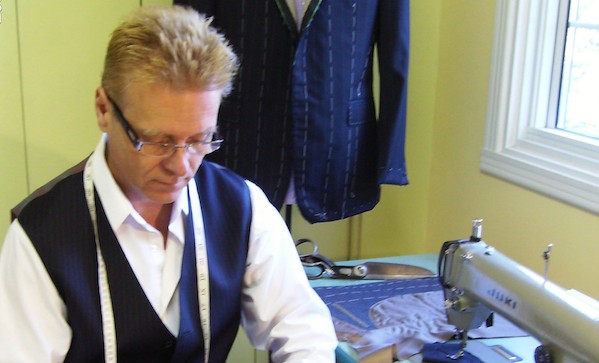It takes a special kind of person to devote themselves to mastering the fine art of bespoke tailoring. There aren’t many true bespoke tailors in the world, and the profession is somewhat of a dying craft.
In Montreal, Hungarian-born Rudolf Popradi is keeping it alive from his home workshop where he makes two suits a month completely by hand. Every cut, every stitch, and every measure is done manually, and he uses only the finest fabrics imported from Italy and England. For him, tailoring is more than a profession—it’s a lifelong passion.
Popradi first discovered his interest in tailoring when he was thirteen years old. “I liked to create fashionable stuff for myself. I thought I could try to create something different, so I already had that passion to create clothes and something that is really sharp,” he says.
It was 1971 when he started his apprenticeship with a master tailor. Three days a week he would go to school, and another three days a week he spent with the tailor. In 1974 he finished the apprenticeship, but it took a total of nine years of one-on-one study to become a master tailor. During his time as an apprentice he made suits for some very prestigious people.
“We had a lot of big clients in those days,” he says. “We had the Austrian Embassy. We had the German Embassy. We even had the Italian Embassy. We worked a lot for them.”
He ran his own shop in Budapest, Hungary for two years before moving to Canada, but it was never his intention to come here. The only reason he did was because he met a Canadian girl at a discotheque, and they fell in love and got married. She couldn’t get used to the European way of life, however, so she wanted to return to Canada. Popradi knew he could work as a tailor anywhere in the world, so he and his wife packed their bags and moved to Montreal in 1981.
Popradi had some trouble adjusting at first due to the language barrier and cultural differences, but before long he was looking for work as a tailor and checked out the various shops in the city. He found a job at a small company, but was disappointed to see that he wouldn’t be doing the same work he did back home.
“I realized what they are doing over here is a totally different system. It’s almost like machine made. I can do it. For me it’s no problem to switch. It just took a few days to get used to it.”
He worked there for a long time, but even though they were making some nice suits he always wanted to leave and resume the bespoke tailoring craft. It was difficult to quit because he felt an obligation to stay. But a friend of his, a tailor who worked at Harry Rosen, convinced him that he was wasting his talents there and it would be better for him to chase his dream.
He made the switch, and hasn’t stopped working since. Today he has clients from all over Quebec and Ontario, and even some from New York City who fly in to Montreal just to see him. He still maintains ties in Europe and has some clients there as well.
But the nature of the business has changed over the years, and Popradi fears that the profession may one day become extinct. ‘True bespoke”, what he does, is one hundred per cent handmade. But today, bespoke can just mean that the suit is made to your measurements and the cutting and stitching are done by machines. There are very few true bespoke tailors left in the world, even in London, England where the profession began in 1790.
“The tailors who know what I know, they are all retired, or older, or have given up. It’s going to be gone in a couple years,” he laments.
But there is still a great deal of appreciation for the skillful craftsmanship that goes into a true bespoke suit. Popradi receives calls from students who are interested in learning, but are unable to commit to the amount of time that it takes. It takes at least five years to master all the techniques in the bespoke tailor’s repertoire.
“It’s very hard work because you have to stitch and stitch and stitch. You have to really love to do it.”
It takes Popradi eighty hours to make one suit, so he can only make two of them per month. Prices range from $3,400 to $8,000. Even after so many years, he still learns new ways of doing things. It is hard work, but rewarding. You won’t get rich, so you have to do it for the love of the craft. That’s why Popradi is a bespoke tailor.
“I can’t see myself not working, and not doing this,” he says.
————
Chris Riddell is a freelance writer from Toronto who covers art, business, and urban life for various fine publications. Also a poet and aspiring novelist, he’s busting his butt trying to get his name into a few literary magazines these days. He encourages you to check out his website for a look at what he’s been working on lately.
___
Photo courtesy of the author.


